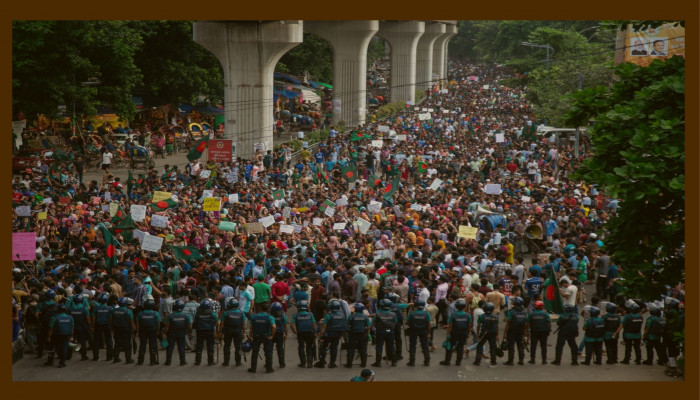Bangladesh acknowledges 88 cases of violent attacks on minorities
- In Reports
- 09:26 PM, Dec 11, 2024
- Myind Staff
The ongoing protests in India over alleged atrocities against Hindus in Bangladesh have brought international attention to the plight of minorities in the neighbouring country. Acknowledging these concerns, Bangladesh has confirmed a series of incidents targeting minorities, primarily Hindus, between August 5 and October 22. According to government data, 88 cases have been registered in connection with these incidents, and at least 70 individuals have been arrested. The disclosure was made by Shafiqul Alam, the press secretary to the interim government head, Muhammad Yunus.
Further details reveal that the Budha Christian Parishad reported several instances of violence against minorities between August 4 and 20. These reports led the police to register 62 cases and arrest 35 individuals involved in the attacks.
Additionally, the government noted 26 cases of attacks on religious sites during the period from August 5 to October 22. These incidents resulted in the arrest of 35 more individuals accused of participating in acts of violence against religious structures.
The Bangladesh government’s acknowledgment of these incidents and arrests underscores its commitment to addressing violence against minorities amidst rising concerns from both domestic and international communities.
“The number of cases and arrests is likely to increase as new incidents of violence have also been reported in northeastern Sunamganj, (central) Gazipur, and other areas," he said. He added that there might be cases where some victims were members of the previous ruling party.
“Some attacks targeted individuals who were former members of the ruling party or they were the result of personal disputes. Nevertheless, since violence occurred, the police are taking appropriate action," he said.
Shafiqul Alam further stated that details regarding incidents occurring after October 22 would be shared in due course. The revelation of these attacks comes months after former Bangladeshi Prime Minister Sheikh Hasina fled the country in August, a development that has left the nation’s political landscape in flux.
On December 9, India’s Foreign Secretary Vikram Misri expressed grave concerns about the recent violence targeting minorities in Bangladesh during his meetings with the Bangladeshi leadership. Misri specifically flagged the regrettable incidents of attacks on minorities and temples, emphasising India’s worries regarding the safety and welfare of these communities.
The spate of violence against Hindus and other minority groups, including attacks on temples, has triggered strong reactions in New Delhi. These incidents over the past few weeks have further strained regional relations and raised urgent calls for ensuring the protection of minority communities in Bangladesh.
Meanwhile, Misri said the talks in Dhaka gave India an opportunity to take stock of the situation after the fall of the Sheikh Hasina administration.
“We want a positive relationship with Bangladesh, which will mutually benefit us. I emphasised that India desires a positive, constructive, and beneficial relationship with Bangladesh. We want a people-centric relationship, and we have a desire to work closely with the current interim government in Bangladesh," he said.
India’s Foreign Secretary Vikram Misri also voiced concerns regarding the safety of minorities in Bangladesh, citing the arrest of Hindu monk Chinmoy Krishna Das and the recent surge in attacks on Hindus. His remarks were followed by widespread protests across India on December 10 as members of various Hindu organisations and civil society groups demonstrated against the violence targeting Hindus in the neighbouring country.
In Delhi, hundreds of people, including members of the Rashtriya Swayamsevak Sangh (RSS), participated in a protest march at Chanakyapuri. A similar rally was held in Lucknow, where participants condemned the attacks on Hindus and called for action.
Protests extended to Dharamsala in Himachal Pradesh, where demonstrators marched to the deputy commissioner’s office to express solidarity with Bangladeshi Hindus. In Jammu, large numbers of protesters took to the streets, urging intervention by both the Indian government and the United Nations to address the situation.
Coinciding with World Human Rights Day, similar demonstrations were organised in cities across India, including Jaipur, Ahmedabad, Ranchi, Guwahati, Bhubaneswar and Kolkata. Protesters carrying placards demanded urgent action from the United Nations Human Rights Council (UNHRC) to halt what they described as the “genocide” of Hindus in Bangladesh.
Security measures were heightened outside the Bangladesh High Commission in Delhi’s Chanakyapuri, where a significant number of protesters gathered to highlight the plight of Hindus in Bangladesh and appeal for immediate international intervention.







Comments